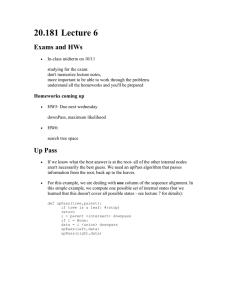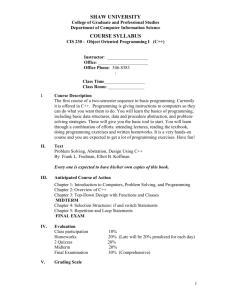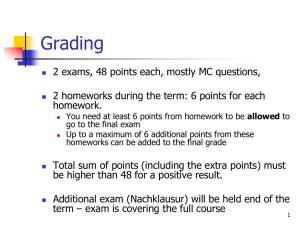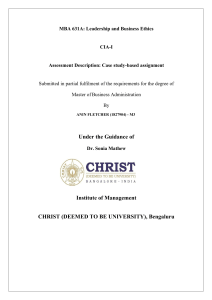North Seattle Community College Summer 2012 ELEMENTARY STATISTICS
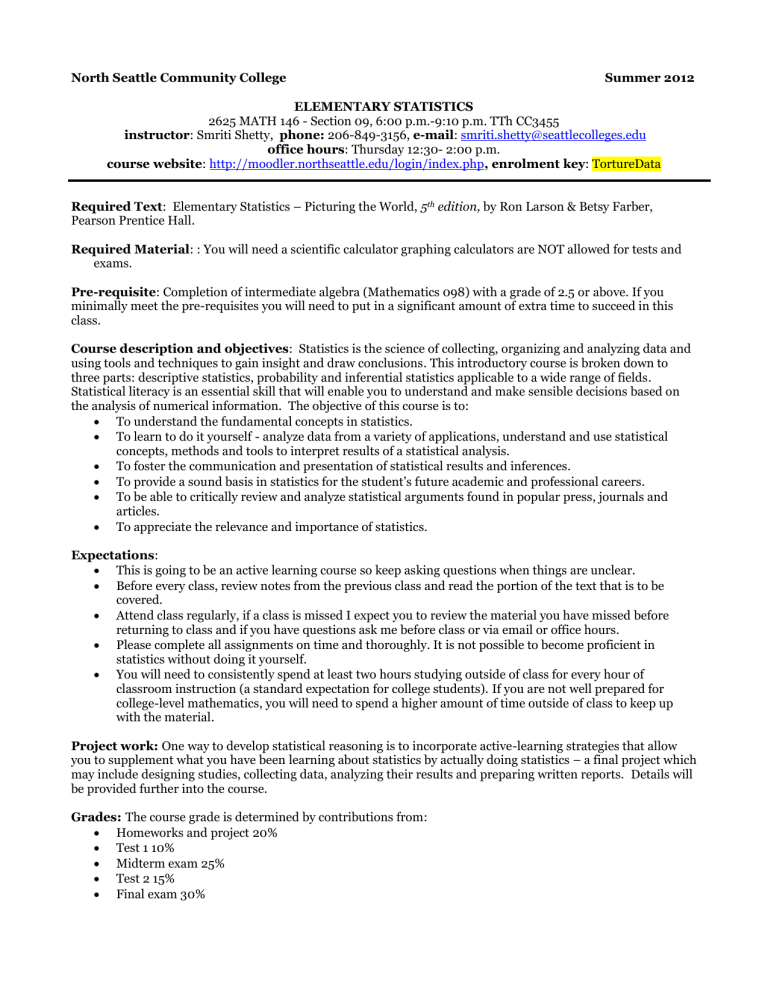
North Seattle Community College
ELEMENTARY STATISTICS
2625 MATH 146 - Section 09, 6:00 p.m.-9:10 p.m. TTh CC3455
Summer 2012
instructor: Smriti Shetty, phone: 206-849-3156, e-mail: smriti.shetty@seattlecolleges.edu
office hours: Thursday 12:30- 2:00 p.m.
course website: http://moodler.northseattle.edu/login/index.php
, enrolment key: TortureData
Required Text: Elementary Statistics – Picturing the World, 5 th edition, by Ron Larson & Betsy Farber,
Pearson Prentice Hall.
Required Material: : You will need a scientific calculator graphing calculators are NOT allowed for tests and exams.
Pre-requisite: Completion of intermediate algebra (Mathematics 098) with a grade of 2.5 or above. If you minimally meet the pre-requisites you will need to put in a significant amount of extra time to succeed in this class.
Course description and objectives: Statistics is the science of collecting, organizing and analyzing data and using tools and techniques to gain insight and draw conclusions. This introductory course is broken down to three parts: descriptive statistics, probability and inferential statistics applicable to a wide range of fields.
Statistical literacy is an essential skill that will enable you to understand and make sensible decisions based on the analysis of numerical information. The objective of this course is to:
To understand the fundamental concepts in statistics.
To learn to do it yourself - analyze data from a variety of applications, understand and use statistical concepts, methods and tools to interpret results of a statistical analysis.
To foster the communication and presentation of statistical results and inferences.
To provide a sound basis in statistics for the student’s future academic and professional careers.
To be able to critically review and analyze statistical arguments found in popular press, journals and articles.
To appreciate the relevance and importance of statistics.
Expectations:
This is going to be an active learning course so keep asking questions when things are unclear.
Before every class, review notes from the previous class and read the portion of the text that is to be covered.
Attend class regularly, if a class is missed I expect you to review the material you have missed before returning to class and if you have questions ask me before class or via email or office hours.
Please complete all assignments on time and thoroughly. It is not possible to become proficient in statistics without doing it yourself.
You will need to consistently spend at least two hours studying outside of class for every hour of classroom instruction (a standard expectation for college students). If you are not well prepared for college-level mathematics, you will need to spend a higher amount of time outside of class to keep up with the material.
Project work: One way to develop statistical reasoning is to incorporate active-learning strategies that allow you to supplement what you have been learning about statistics by actually doing statistics – a final project which may include designing studies, collecting data, analyzing their results and preparing written reports. Details will be provided further into the course.
Grades: The course grade is determined by contributions from:
Homeworks and project 20%
Test 1 10%
Midterm exam 25%
Test 2 15%
Final exam 30%
Your percentage corresponds to decimal grades as indicated by the scale below:
93% and up
>= 90%
3.9 and 4.0*
3.8
>= 80%
>= 70%
3.0
2.0
>= 60%
>= 50%
Under 50%
1.0
0.7
0.0 or NC
*A course percentage of at least 93%, and a score of at least 90% on each test and midterm earns a 4.0.
Homeworks: Please do your homework on a daily basis and don’t fall behind. Plan on spending a minimum of
10 hours per week on homework. The purpose of homework is for practice and for you to make sure you know how to do the problems. The more you practice the more proficient you will be at the material which will give you a strong foundation for all your future math classes. Homework should be neat, in pencil, and organized. You also must show your work (unless it’s a simple, one-step problem). If the problem requires a graph, clearly label the x and y axis and any pertinent points. Homework will be due before each test.
Cell phone policy: Cell phones MUST be turned off in class and are absolutely NOT permitted during exams.
Academic Honesty: Academic honesty is highly valued at NSCC. A student must always submit work that represents his/her original words or ideas. If any words or ideas are used that do not represent the student’s original words or ideas, the student is expected to cite all relevant sources both in the text and in the references listing at the end of the paper. The student should also make clear the extent to which such sources were used.
Words or ideas that require citations include, but are not limited to, all hardcopy or electronic publications, whether copyrighted or not, and all verbal or visual communication when the content of such communication clearly originates from an identifiable source.
Students with Disabilities: If you need course accommodations, have emergency information to share with me, or require special arrangements in case the building needs to be evacuated, please contact the Disability
(206) 934-3697 , TTY (206) 934-0079 or email ds@seattlecolleges.edu
. Services, Phone:
Website: www.northseattle.edu/services/disability/
Student Support Services: You are encouraged to seek campus support services when necessary to support their learning and academic progress. Refer to student handbook, brochures/flyers, or college website for information about:
Disability Services Advising Center
Tutoring Services Student Leadership Programs
Library Financial Aid Office
Counseling Women’s Center
Multicultural Services Office Wellness Center
LOFT Writing Center Plus Admission/Registration/
Records/Credentials (ARRC)
Tentative Course outline:
